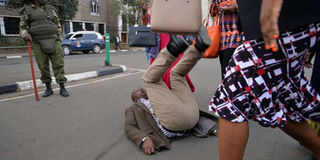Raila is flat wrong on polls but Uhuru camp scored an own goal

Nyando MP Fred Outa protests outside parliament buildings over the amendments of the electoral laws on December 22, 2016. PHOTO | SALATON NJAU | NATION MEDIA GROUP
What you need to know:
- What would have been so hard in calling together the stakeholders that negotiated the joint parliamentary committee’s resolutions and pointing out that experts had flagged a number of problematic sections of the deal arrived at by incompetent MPs from both sides?
- Why couldn’t they, at least, launch a communications outreach to enlighten the public about the need for a back-up system and outline how legitimate fears about voter-inflation in strongholds of the main parties would be addressed?
- The case is really easy to make. Automation of elections is a welcome effort to bolster transparency but the systems are far from fool-proof as ample experience has shown.
Kenyans are a truly peculiar people. Anybody with any knowledge of the recent history of elections in Africa would find it staggering that Cord and Jubilee are now fighting over whether there should be a manual backup to electronic systems at the next election.
Of course there must be. If you don’t have such a backup, you will be guaranteed the near-disaster that Ghana experienced in 2012.
In that presidential election, the West Africans decided to go fully electronic. The election turned into a debacle with numerous electronic voter identification devices failing.
In total, according to local observers, 33 per cent of polling stations experienced the problem in the capital Accra alone.
With many people unable to vote, ballots were stored in police stations and voting extended by a day. The ruling party candidate John Mahama was announced the victor by a narrow margin.
It is not good practice for a columnist to quote themselves but, on December 15, 2012, I wrote that it was a marvel how patient Ghanaians were and shuddered at the thought that a similar scenario – where tens of thousands woke up to find that they could not vote because devices were not working – played out in Kenya. It was headlined: If Kenyans were in Ghanaian voters’ shoes, the country would now be on fire.
How then can we contemplate replaying such a mess here, in a country in which people are much more predisposed to politically driven violence?
The supreme irony is that the Ghanaian electoral commission took lessons on the importance of a backup manual register from Kenya’s 2013 election.
This is what Prof Karuti Kanyinga wrote in the Sunday Nation just last week after attending a talk by the Ghanaian electoral body chief.
“Ms (Charlotte) Osei mentioned that the roll of registered voters is prepared early enough for voters to verify. Biometric Voter Registration is the in-thing but there is also a fallback position in case this fails: There is a manual register, too.”
Wouldn’t it be truly peculiar if Kenya went into an election as Ghana did in 2012 without a backup knowing very well it would be courting disaster? Funny enough, in the most recent election where Ghana had electronic voting with a manual backup, the same opposition leader, Nana Akufo-Addo, who was beaten in 2012, squarely defeated Mahama.
Opposition leader Raila Odinga and Cord are absolutely wrong on this matter.
But the Jubilee side never ceases to amaze with its political clumsiness and ineptitude. What would have been so hard in calling together the stakeholders that negotiated the joint parliamentary committee’s resolutions and pointing out that experts had flagged a number of problematic sections of the deal arrived at by incompetent MPs from both sides?
Why couldn’t they, at least, launch a communications outreach to enlighten the public about the need for a back-up system and outline how legitimate fears about voter-inflation in strongholds of the main parties would be addressed?
The case is really easy to make. Automation of elections is a welcome effort to bolster transparency but the systems are far from fool-proof as ample experience has shown.
In last year’s election, the voter reader failed to recognise the thumb-print of president Goodluck Jonathan in Nigeria! Similar problems were noted in numerous other countries where the method was tried. The Mail and Guardian noted that in Nigeria, election officials took to asking voters to wash their hands before voting, concluding that many farmers were being rejected due to soiled hands. In all cases, the manual back-up helped.
But, no. Instead, Uhuru Kenyatta and William Ruto decided to act, not in the fashion of the leaders of a republic, but as though they are emperors presiding over a private fiefdom.
Commanding MPs to bulldoze through amendments in the fashion they did on Thursday undermines the principle of separation of powers and diminishes the legislature.
To do this with respect to a negotiated document is an act of bad faith and political short-sightedness.
It was, in fact, a gift to the opposition whose position on this issue is not very enlightened.
So here we go again. As Raila Odinga told his outstanding interviewer, Hussein Mohamed of Citizen TV, the nation should steel itself for a fresh round of protests.
The problem is that blood will be spilt and Kenyans bitterly divided simply because of the political ineptitude of the President and the misguided demands of the opposition leader. Peculiar is not the right word. Tragic sums it up better.
[email protected] @mutigam





